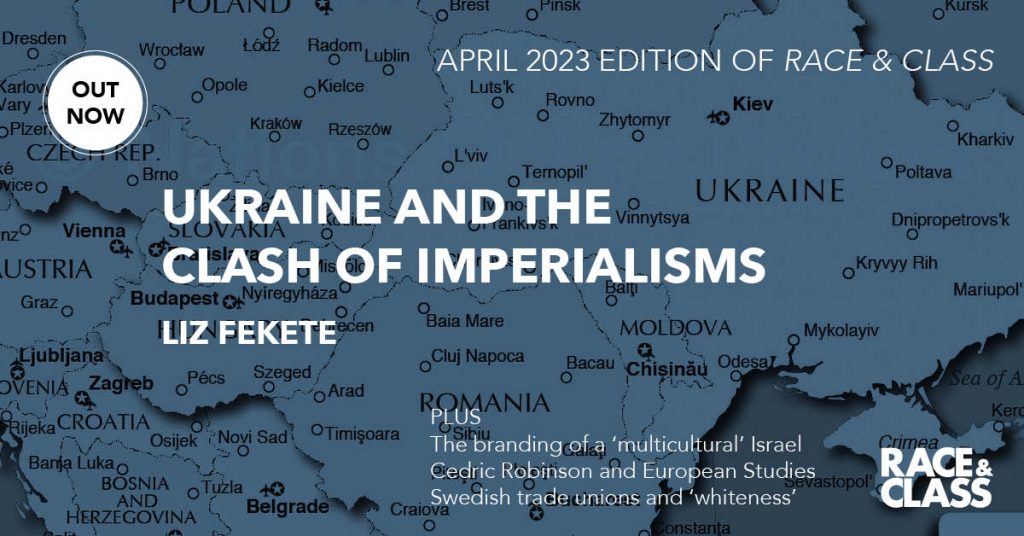The April 2023 issue of Race & Class offers a challenge to how Europe is understood and explores the origins and impacts of civilisational racism.
A year on from the start of Russia’s brutal invasion of Ukraine, IRR director Liz Fekete in the April issue of Race & Class takes issue with simplistic and partial positions. In ‘Civilisational racism, ethnonationalism and the clash of imperialisms in Ukraine’ she attacks the Eurocentrism that divides the world into a civilisational hierarchy of the enlightened West and the backward tyrannical ‘other’ – a framework that, she argues, obscures the dynamics of global imperialisms today and creates new forms of civilisational racism. As Fekete outlines, we need a global anti-racist perspective that confronts the Eurocentrism of civilisational frameworks.
One of the key areas in which civilisational racism functions is in the comparative racialisation of migrants and refugees, in Europe and beyond. In her article on ‘Migrant labour debt and the branding of a “multicultural” Israel’, Rachel Brown, assistant professor of Women, Gender, and Sexuality Studies at Washington University in St. Louis, examines how Filipina caregiver Rose Fostanes, winner of X-Factor Israel, was used to reframe Israel as multicultural and economically empowering for migrants. By examining media representations of Fostanes, Brown sheds light on the debtor/creditor relation in the context of Israeli settler colonialism and the country’s reliance on migrant labour.
The enslavement of foreign labour in Europe, was, as Cedric Robinson argues, foundational to the West’s culture of racialism. Dušan Bjelić, sociologist and pioneer of Balkan Studies in the US, in his article on ‘Cedric J. Robinson, Black radicalism and the abolition of Europe’, discusses why European Studies as a whole has been so reluctant to accept Robinson’s work on medieval history which uncovers the erased history of European slavery in order to show how European culture was racialist from the very beginning.
Racial capitalism is alive and well in Sweden. Inspired by Cedric Robinson’s work, Paula Mulinari, associate professor at the Institution of Social Work in Malmö University and sociology professor Anders Neergaard explore the impact of new employment protection regulation implemented in Sweden in October 2022. They analyse the positions of three trade unions on the new regulation, on the face of it colour-blind but with racialised effects as regards the non-white sectors of the working- and middle-classes.
Articles
- Civilisational racism, ethno-nationalism and the clash of imperialisms in Ukraine by Liz Fekete
- Migrant labour, debt and the branding of a ‘multicultural’ Israel by Rachel Brown
- Trade unions negotiating the Swedish model: racial capitalism, whiteness and the invisibility of race by Paula Mulinari and Anders Neergaard
- Cedric J. Robinson, Black radicalism and the abolition of Europe by Dušan Bjelić
- The Hanau massacre and state (in)action: a dossier by Oscar Herzog Astaburuaga
- Policing rights in the UK 2022: an audit by Frances Webber
Book reviews
- On the Scale of the World: the formation of Black anticolonial thought by Musab Younis (Jenny Bourne)
- Empire’s Violent End: comparing Dutch, British and French wars of decolonization 1945 –1962 edited by Thijs Brocades Zaalberg and Bart Luttikhuis (John Newsinger)
- Decolonial Marxism: essays from the Pan-African revolution by Walter Rodney, edited by Asha Rodney, Patricia Rodney, Ben Mabie and Jesse J. Benjamin (Donari Yahzid)
- I was a Red Priest: memories and testimonials by Jean Boulier, translated by Toby Terrar (Dean Richards)
- Shoot to Kill: police and power in South Africa by Christopher McMichael (Liz Fekete)
How to read
If you have academic access, you can read any of the articles via Sage Publishing and the links above. Physical copies can be ordered on our website for £6 + postage & packaging and for simple digital access, that includes our back catalogue from 2008 onwards, subscribe at Exact Editions.

